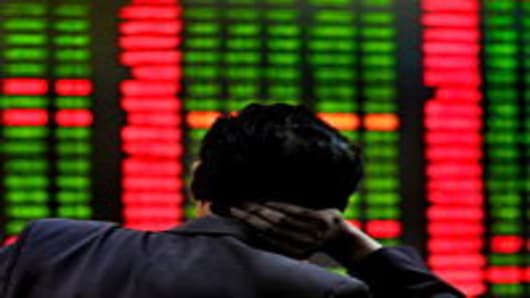A 30-year-old trader at a Hong Kong-based hedge fund has slashed his holdings in equities from 25 percent of personal savings to near zero over the past one year, making him one of many individual investors in Asia who have been pushed to the sidelines owing to extreme market volatility.
"Cash is king, liquidity is important. I have a good chunk of my net worth in property so I wanted to reduce other volatile components of my portfolio," the Hong Kong national, who requested to stay anonymous, told CNBC, adding that he has turned to high-grade corporate credit, instead.
Since the onset of the euro zone debt crisis, Asian markets, like their Western counterparts, have been characterized by large swings, making it increasingly difficult for retail investors to profit from their equity investments. Fatigued with the stock market volatility, many are calling it quits and resorting to traditionally safer assets such as real estate, bonds or even bank deposits.
Puru Saxena, CEO of Hong Kong-based Puru Saxena Wealth Management says he has witnessed a sharp decline in interest around equities among his clients.
“Our clients aren’t interested in stocks, they have been burnt too many times in the last decade. They have gotten to the point of revulsion,” Saxena said.
“Investors don’t trust the banks and financial services sectors. Every second week you hear about a bank CEO lying in front of Congress testimonies - that’s not a good sign,” he added.
Saxena, who runs both stock and bond portfolios for his clients, says he’s seen a significant rise in interest for fixed-income, “Over the last 2 years, our net business in fixed income has been 20 times as much as stocks.”
Declining Volumes
Flagging interest in equity trading is showing up in the volumes of the region’s top stock exchanges in Singapore and Hong Kong. Retail investors account for approximately 30 percent of the turnover in both Singapore and Hong Kong so their absence can have an impact on the market.
Securities turnover on the Singapore Exchange (SGX) , for example, fell 25 percent in June from a year earlier and dropped 18 percent from the previous month to S$21.2 billion ($16.89 billion). While on the Hong Kong Exchange (HKEx) , securities turnover last month fell 35 percent from a year earlier and 21 percent from the previous month to HK$951.20 billion ($122.62 billion).
Jake Chow, stockbroking associate at CIMB Securities in Singapore says his retail clients are either waiting on the sidelines or paring down their trading positions. “Some investors are reducing their exposure to stocks by 30-40 percent,” he said.
Among his clients, Chow says money coming out of the equity market is going into property investments either locally or around the region in countries such as Indonesia and the Philippines.
Forty-seven-year-old Errol Mascarenhas, a sales executive at a computer software firm, based in Singapore, who stopped investing in the country’s stock market one year ago, is one such example.
“The market was fluctuating too much; for an investor like me who doesn’t do much research it was too dangerous. I’m staying away now and looking to buy a property instead,” he said, adding that all his savings are now sitting in bank deposits.
Both Mascarenhas and the hedge fund trader say they have no intention to return to the equity markets in the near future.
“Until there is some sort of consensus that we are not subject to daily headline-driven risks, I will stay on the sidelines,” the trader said.
—By CNBC’s Ansuya Harjani.



